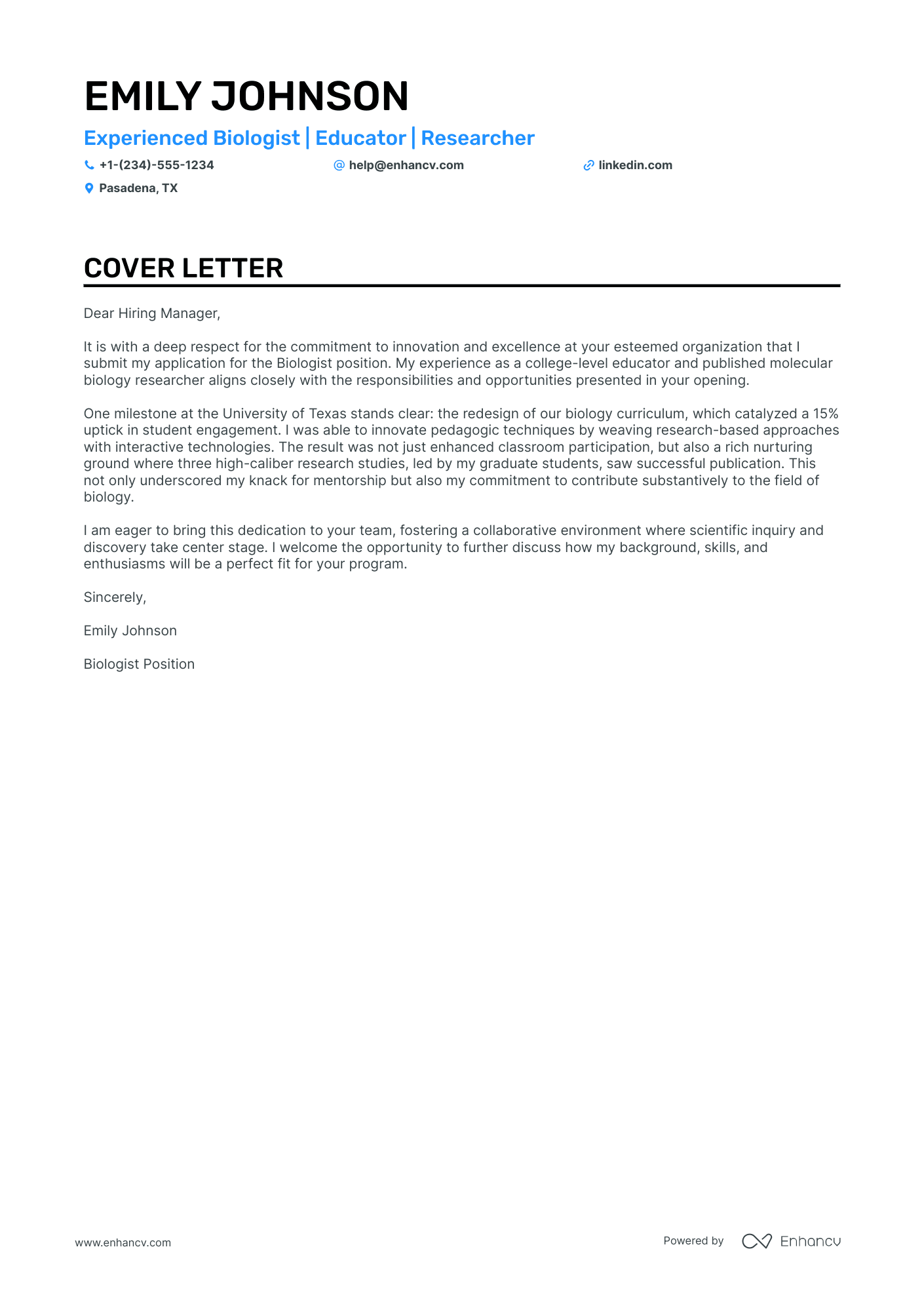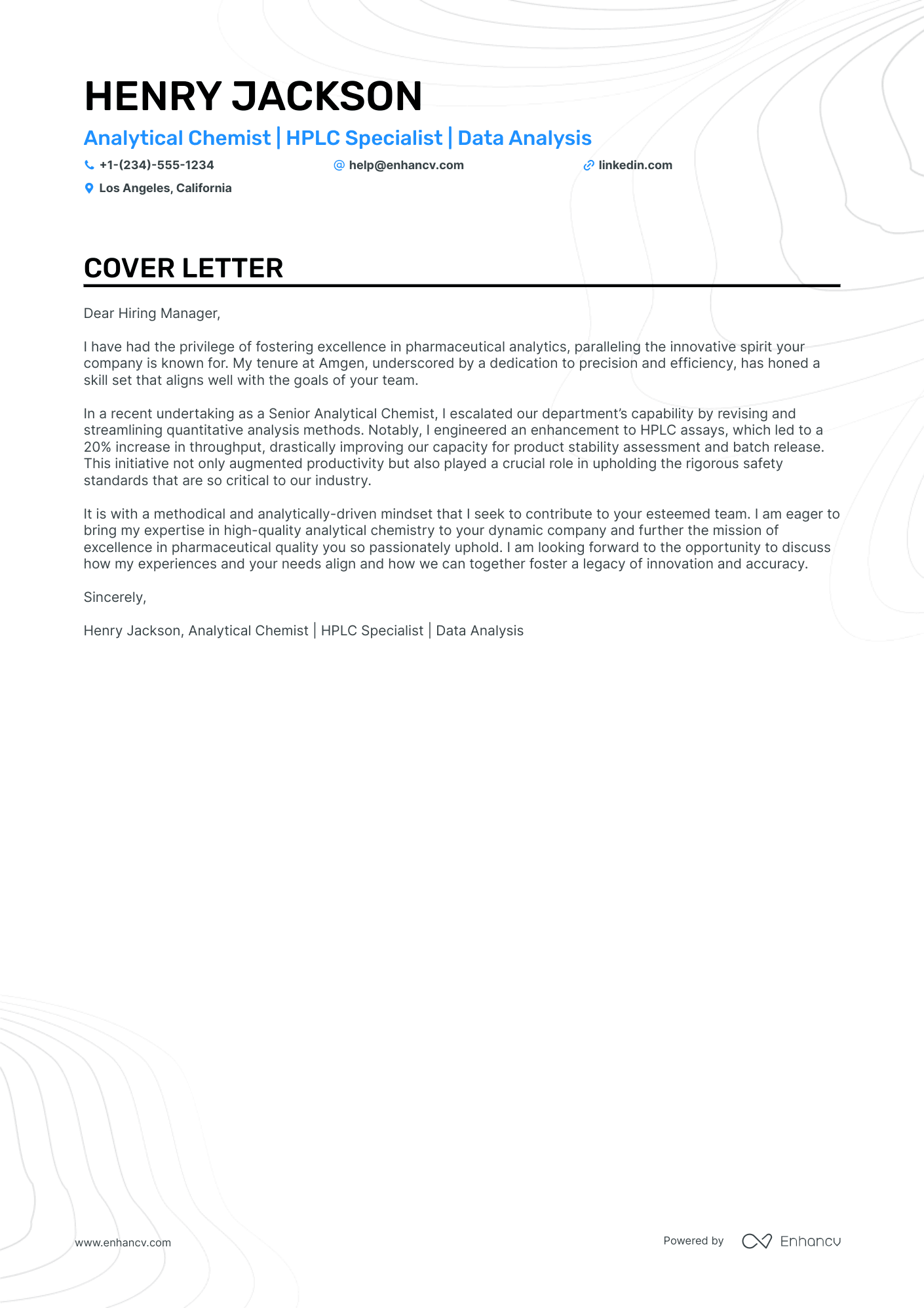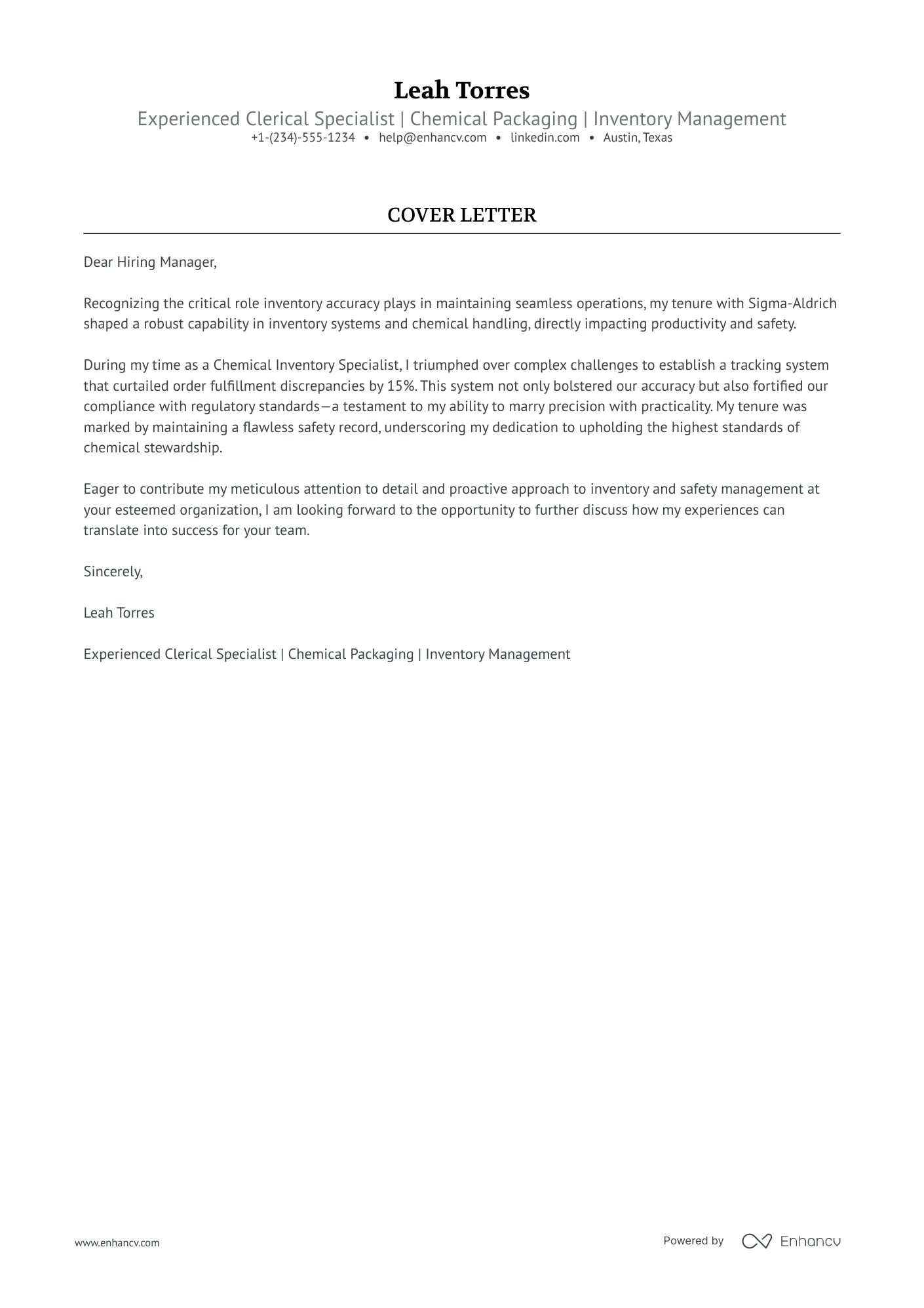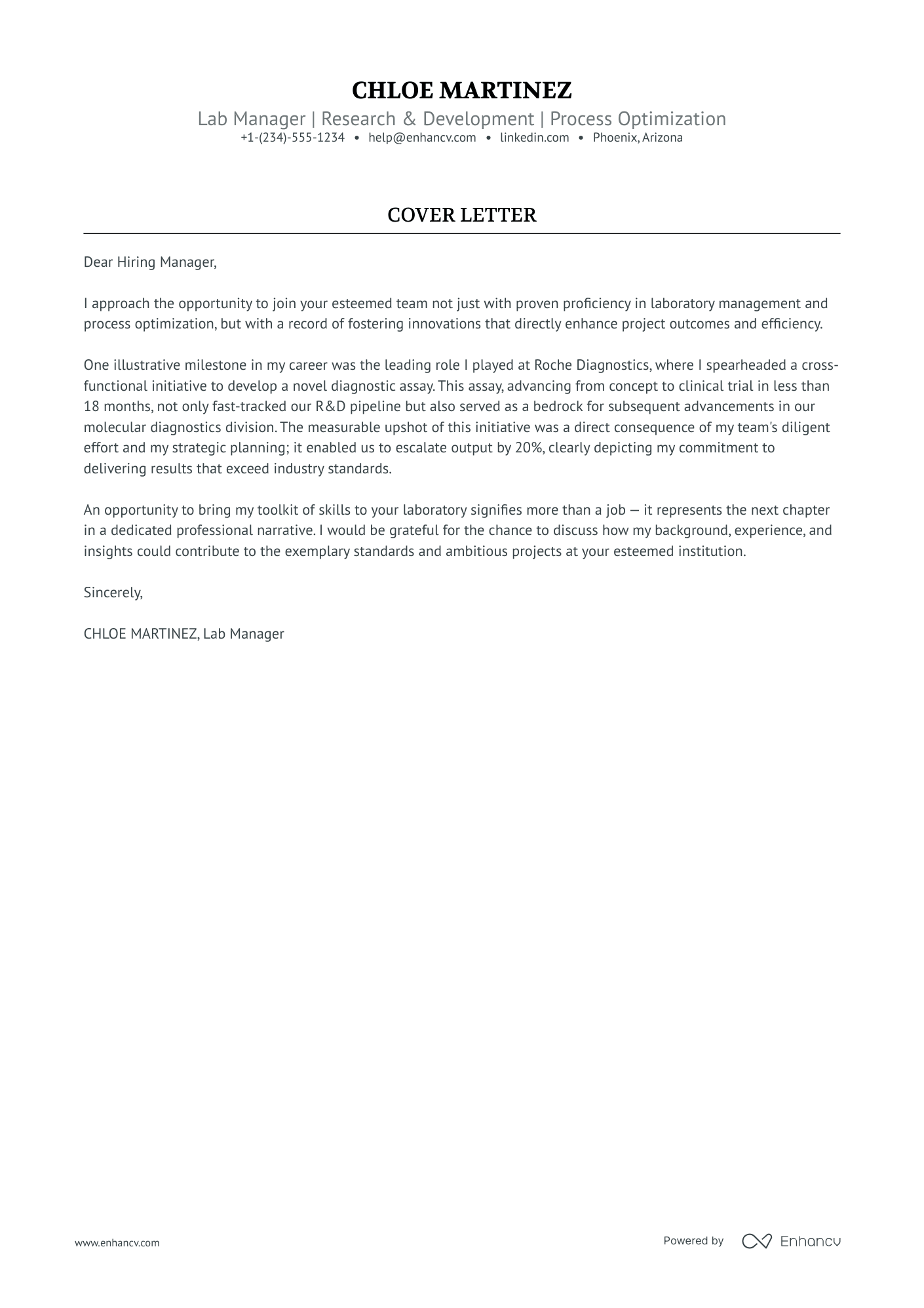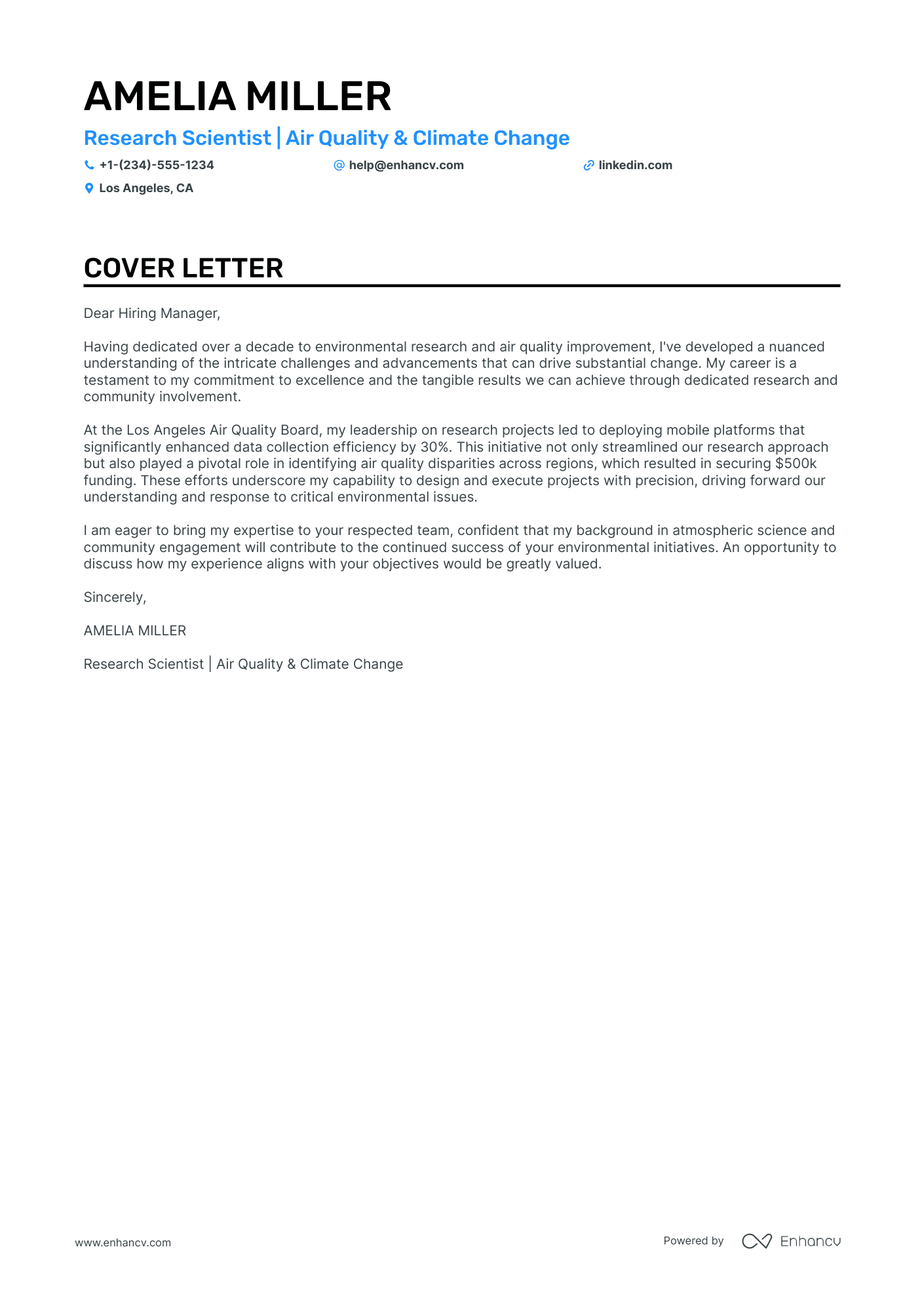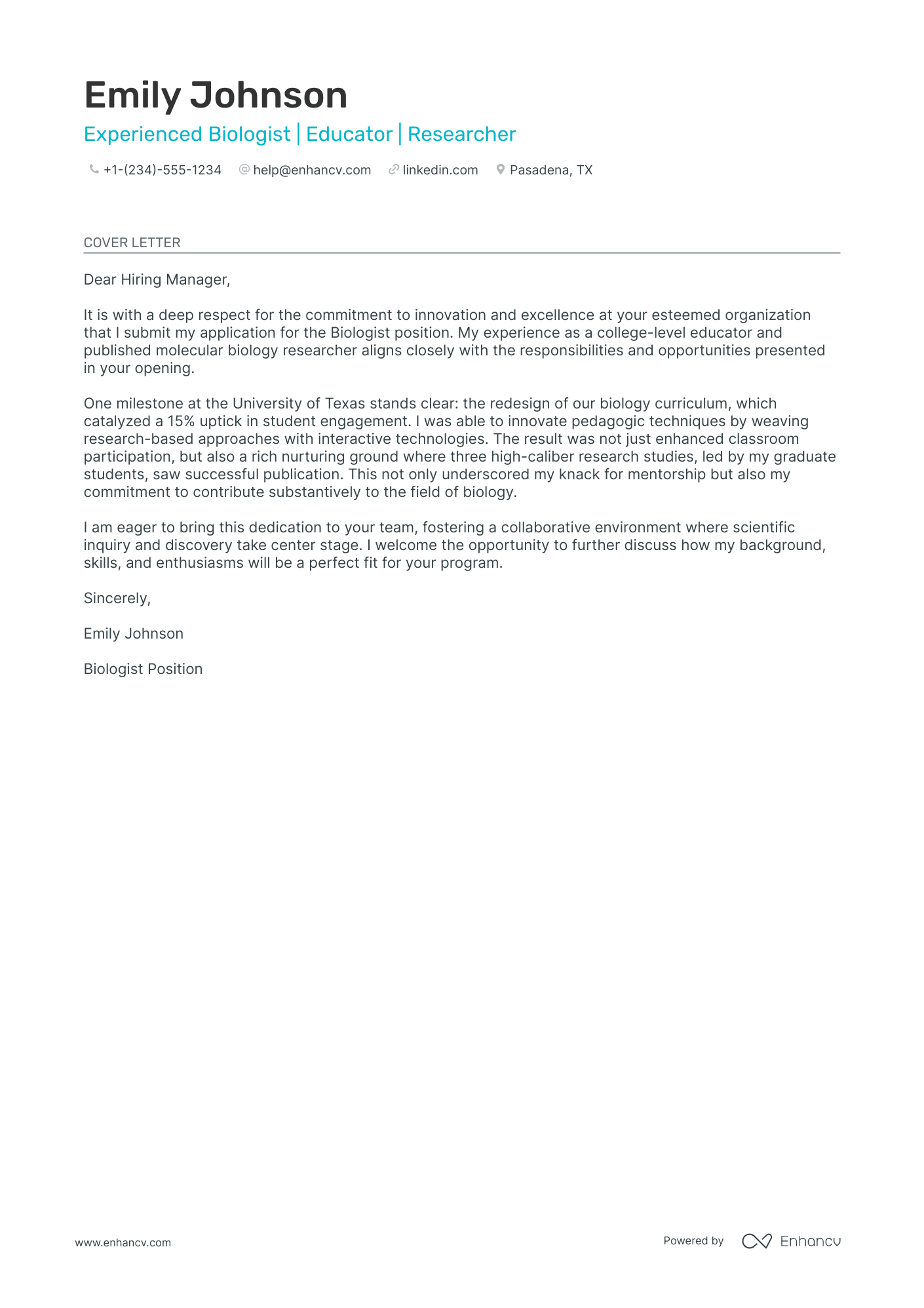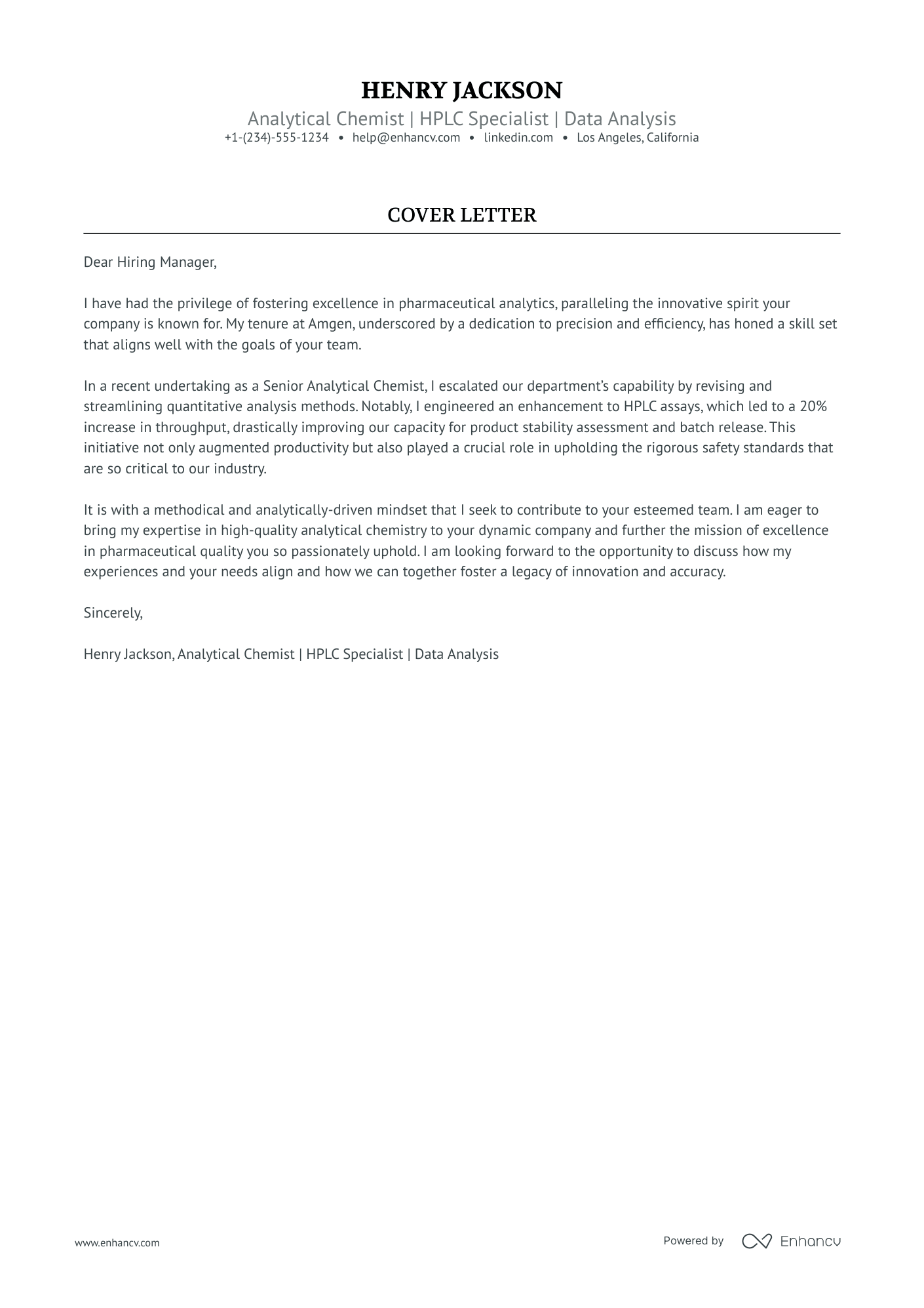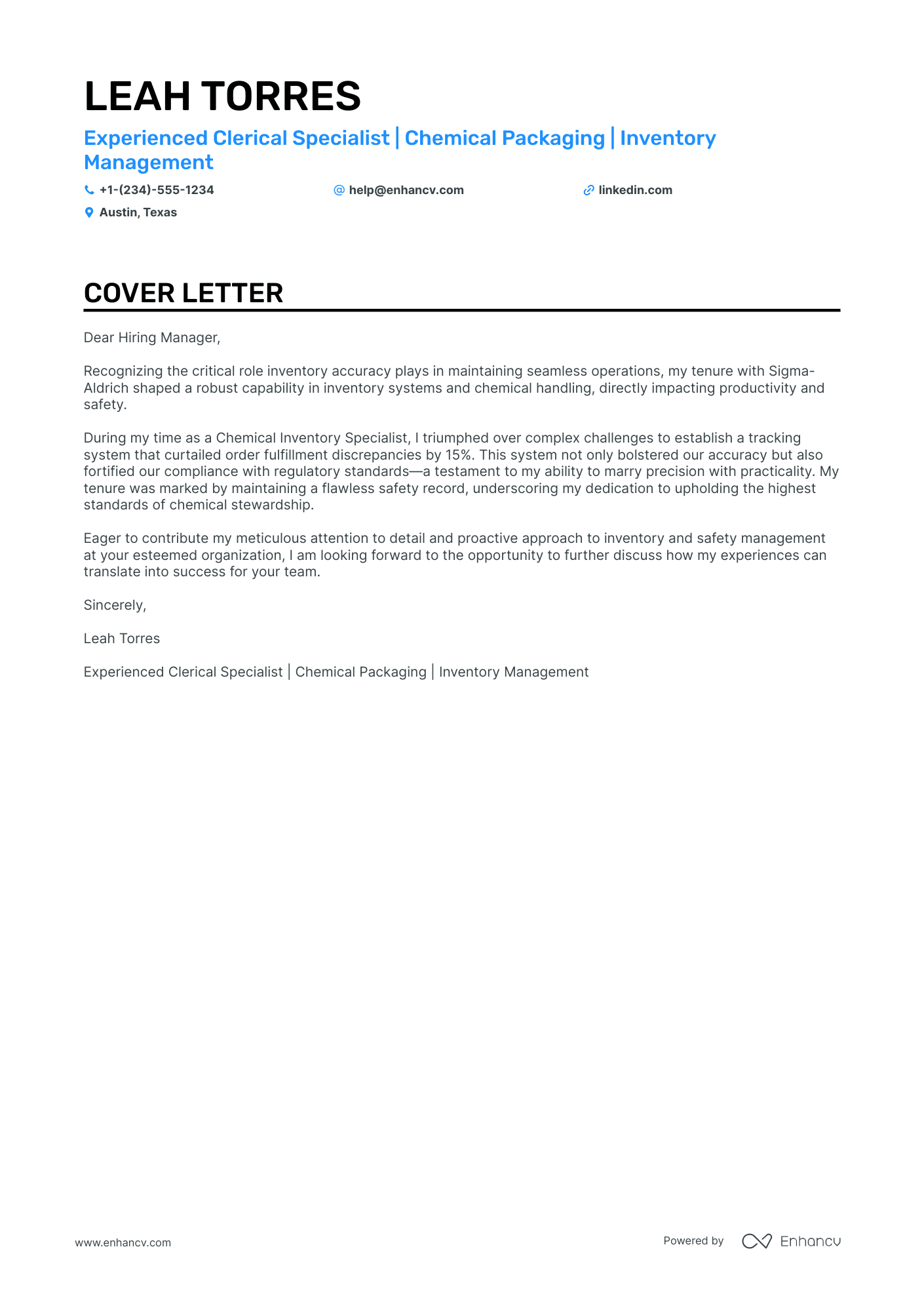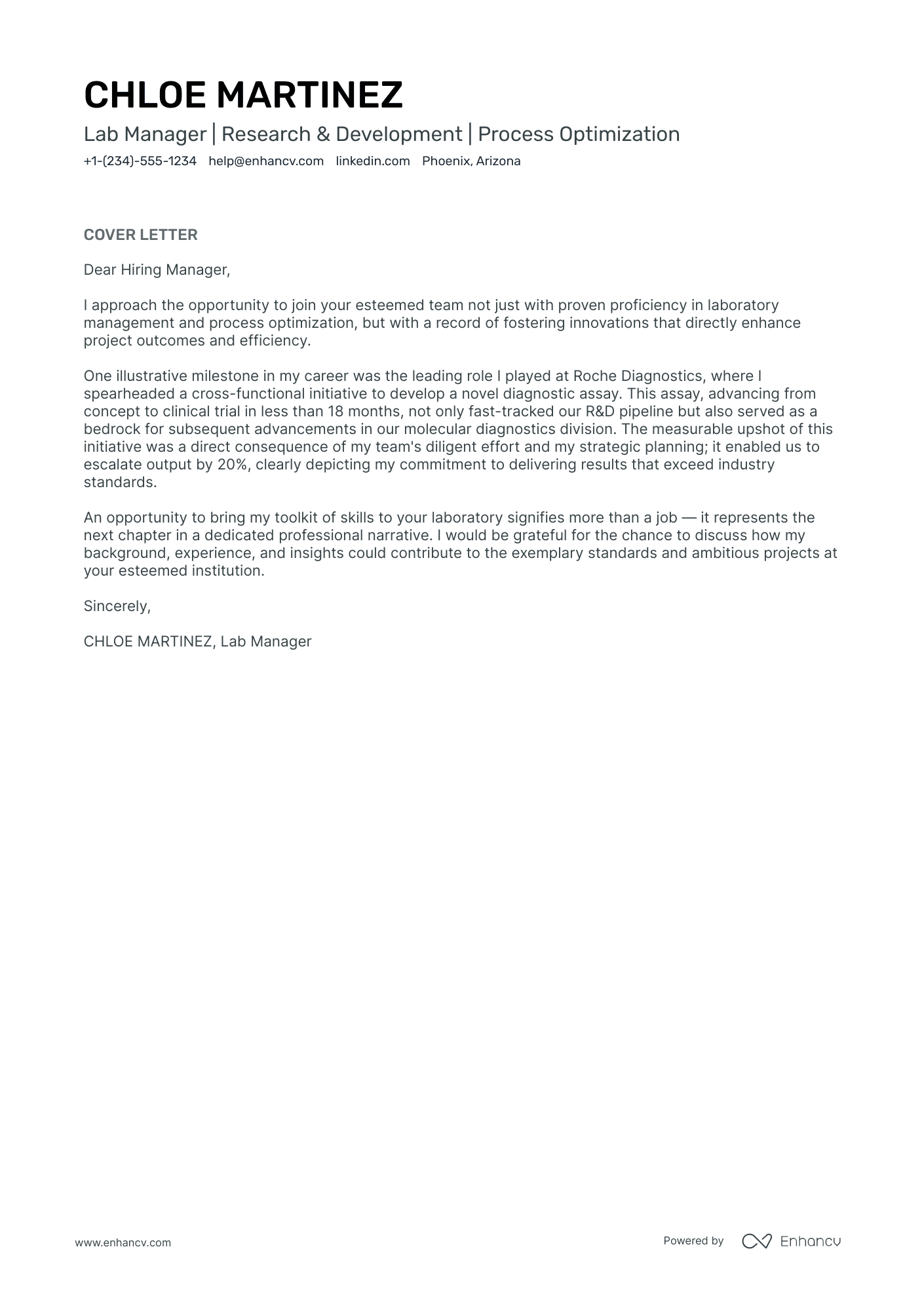Crafting a scientist cover letter can be a daunting step in your job search. You've polished your resume and started applying, only to realize a powerful cover letter is required—one that doesn't just echo your resume. Focus on highlighting a pivotal achievement, weaving a narrative of your proudest professional moment without falling into clichés. Remember, brevity is key: a compelling, formal cover letter should capture your essence in just one page. Let's dive into making yours stand out.
- Create a scientist cover letter to persuade the recruiters you're the best candidate for the role;
- Use industry-leading scientist cover letter templates and examples to save time;
- Dedicate your scientist cover letter space to your best achievement;
- Make sure your scientist cover letter meets recruiters' expectations and standards.
Avoid starting at the blank page for hours by using Enhancv's AI - just upload your resume and your scientist cover letter will be ready for you to (tweak and) submit for your dream job.
If the scientist isn't exactly the one you're looking for we have a plethora of cover letter examples for jobs like this one:
- Scientist resume guide and example
- Quality Control Chemist cover letter example
- Biology cover letter example
- Clinical Research Assistant cover letter example
- Student Researcher cover letter example
- Lab Assistant cover letter example
- Research Associate cover letter example
- Researcher cover letter example
- Chemist cover letter example
- Graduate Research Assistant cover letter example
- Research Director cover letter example
Drop your resume here or choose a file.
PDF & DOCX only. Max 2MB file size.
Scientist cover letter example
CHARLOTTE JONES
Chicago, IL
+1-(234)-555-1234
help@enhancv.com
- Customization to the organization: The cover letter specifically acknowledges the employer's contributions to biotechnology, demonstrating that the candidate has researched the company and is genuinely interested in their particular work.
- Key achievements: It highlights a significant professional achievement relevant to the role, such as the development of a cell staining protocol that improved flow cytometry precision, showcasing the candidate's expertise and potential benefits to the prospective employer.
- Relevant experience: The cover letter cites specific experience with cell culture and assay development, which are likely to be vital for a role in biochemistry and cell biology, underscoring the applicant's suitability for the job.
- Professional contribution: It implies a dedication to improving cancer treatments, which aligns with the hiring organization's goals and suggests that the candidate's personal and professional missions are a match for the role they are applying for.
Structuring and formatting your scientist cover letter
Here's what the structure of your scientist cover letter should include:
- Header (with your name, the position you're applying for, and the date);
- Salutation (or greeting);
- Introductory paragraph (or your opening statement);
- Body paragraph (or further proof of your experience);
- Closing paragraph (with a call to action);
- Signature (that is optional).
Use the same font for your scientist resume and cover letter - modern fonts like Lato and Rubik would help you stand out.
Your scientist cover letter should be single-spaced and have a one-inch margins - this format is automatically set up in our cover letter templates and our cover letter builder.
When submitting your cover letter, always ensure it's in PDF, as this format keeps the information intact (and the quality of your document stays the same).
On one final note - the Applicant Tracker System (ATS or the software that is sometimes used to initially assess your application) won't read your scientist cover letter.
Let us save you time! With our free cover letter generator, you can create a professional letter instantly using your resume.
The top sections on a scientist cover letter
- Header: This includes the candidate's contact information, date, and the employer's contact details, allowing the recruiter to easily identify and reply to the applicant.
- Introduction: A strong opening paragraph that briefly explains the applicant's scientific background, passion for research, and the specific position they are applying for, engaging the recruiter's interest from the beginning.
- Research Experience and Skills: This section highlights the candidate's most relevant scientific achievements, research projects, and technical skills, showcasing their suitability for the role.
- Motivation and Fit: Here, the candidate should elucidate their reasons for interest in the organization's research focus, and how their goals align with the institution's mission and values, demonstrating personal and professional compatibility.
- Closing Paragraph: The candidate should use this section to summarise their qualifications, reiterate their enthusiasm for the position, and express a desire for a personal interview, leaving a professional and memorable impression.
Key qualities recruiters search for in a candidate’s cover letter
Expertise in a relevant scientific field: Recruiters look for candidates with specialized knowledge and a track record of research or projects in areas pertinent to the role.
Research experience: Having a strong background in designing, conducting, and analyzing experiments is crucial for a scientist role as it demonstrates the ability to contribute to knowledge creation.
Publications and presentations: A list of peer-reviewed publications and conference presentations validate a candidate's proficiency and recognition in their scientific community.
Technical proficiency: Knowledge of and experience with specialized equipment, laboratory techniques, and software relevant to the field indicate a candidate's capability to perform required tasks.
Collaborative skills: Science often involves teamwork. Demonstrating successful collaborations shows that a candidate can work effectively in a multidisciplinary team.
Problem-solving abilities: Scientists must be able to design experiments to test hypotheses and adapt when faced with unexpected results, showcasing critical thinking and flexibility.
How to address hiring managers in your scientist cover letter greeting
Goodbye, "Dear Sir/Madam" or "To whom it may concern!"
The salutation of your scientist cover letter is how you kick off your professional communication with the hiring managers.
And you want it to start off a bit more personalized and tailored, to catch the recruiters' attention.
Take the time to find out who's recruiting for the role (via LinkedIn or the company page).
If you have previously chatted or emailed the hiring managers, address them on a first or last name basis.
The alternative is a "Dear HR team" or "Dear Hiring Manger", but remember that a "Dear Ms. Simmons" or "Dear Simon," could get you farther ahead than an impersonal greeting.
List of salutations you can use
- Dear Hiring Manager,
- Dear Dr. [Last Name],
- Dear Prof. [Last Name],
- Dear Search Committee,
- Dear [Specific Role Title] Selection Team,
- Dear [Department] Team,
The scientist cover letter intro: aligning your interest with the company culture
You only have one chance at making a memorable first impression on recruiters with your scientist cover letter.
Structure your introduction to be precise and to include no more than two sentences.
Here are some ideas on how to write a job-winning scientist cover letter introduction:
- get creative - show off your personality from the get-go (if this aligns with the company culture);
- focus on your motivation - be specific when you say what gets you excited about this opportunity.
Storytelling in the middle (or body) of your scientist cover letter
You've got your whole resume sorted, detailing your achievements and skills. What else can you write in your scientist cover letter?
For starters, take the time to re-assess the job requirements and re-discover the most crucial skills and requirements (or keywords).
After making a list of these important keywords, look back on your experience to select just one of your past accomplishments.
Choose the achievement that is the most noteworthy, relevant to the role, and matches the required skills.
Use the next between three and six paragraphs to narrate how:
- you've grown your skill set, thanks to your achievement;
- you'd use the know-how you've gained in your new role;
- your accomplishment could help your potential employers grow.
Remember that recruiters don't need a retelling of your whole resume, but want to find out what makes you, you.
Time to wrap up your scientist cover letter
Writing the closing paragraph of your scientist cover letter is just as important as the salutation.
You have to make it personalized to the job advert and recruiter.
Experienced professionals advise candidates to end with a request or reminder for follow-up. Write that you're grateful for the opportunity, and, at the same time, hint that you're available for the next steps of the process.
Otherwise, you could also conclude your scientist cover letter by facing the future. How do you see yourself, as part of the team? In particular, how would you settle in your new role in the first six months to a year?
What to write on your scientist cover letter, when you have zero experience
The best advice for candidates, writing their scientist cover letters with no experience, is this - be honest.
If you have no past professional roles in your portfolio, focus recruiters' attention on your strengths - like your unique, transferrable skill set (gained as a result of your whole life), backed up by one key achievement.
Or, maybe you dream big and have huge motivation to join the company. Use your scientist cover letter to describe your career ambition - that one that keeps you up at night, dreaming about your future.
Finally, always ensure you've answered why employers should hire precisely you and how your skills would benefit their organization.
Key takeaways
Writing your scientist cover letter doesn't need to turn into an endless quest, but instead:
- Create an individual scientist cover letter for each role you apply to, based on job criteria (use our builder to transform your resume into a cover letter, which you could edit to match the job);
- Stick with the same font you've used in your resume (e.g. Raleway) and ensure your scientist cover letter is single-spaced and has a one-inch margin all around;
- Introduce your enthusiasm for the role or the company at the beginning of your scientist cover letter to make a good first impression;
- Align what matters most to the company by selecting just one achievement from your experience, that has taught you valuable skills and knowledge for the job;
- End your scientist cover letter like any good story - with a promise for greatness or follow-up for an interview.
Scientist cover letter examples
By Role
